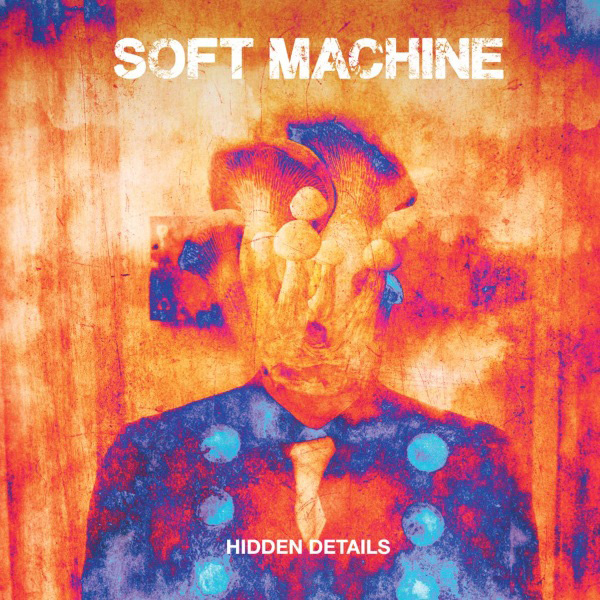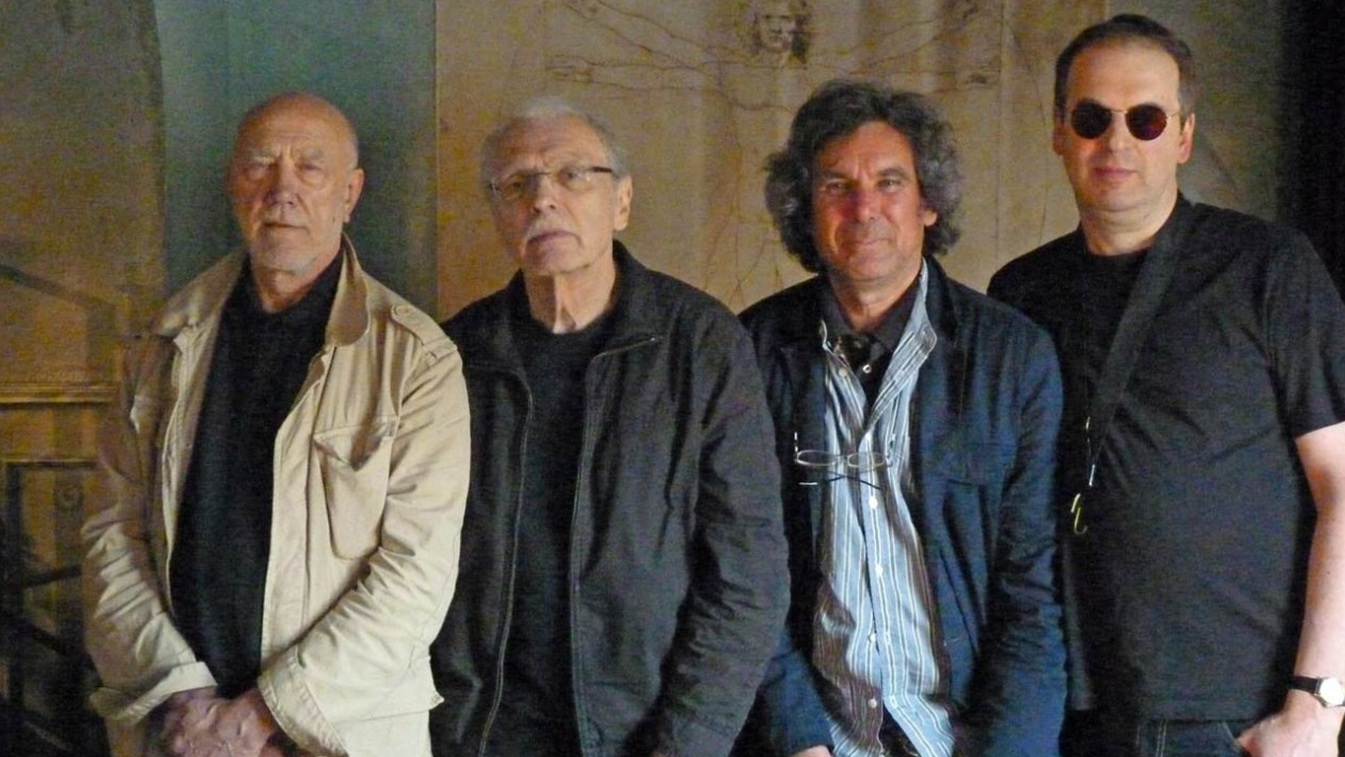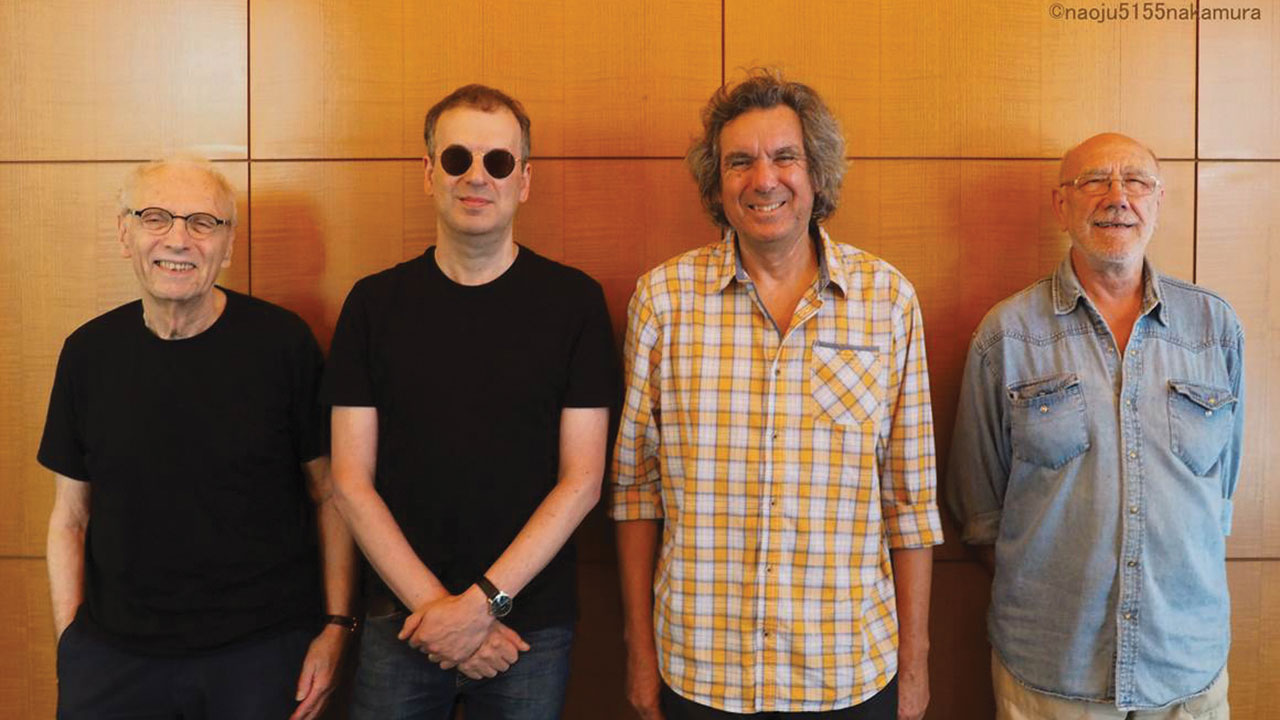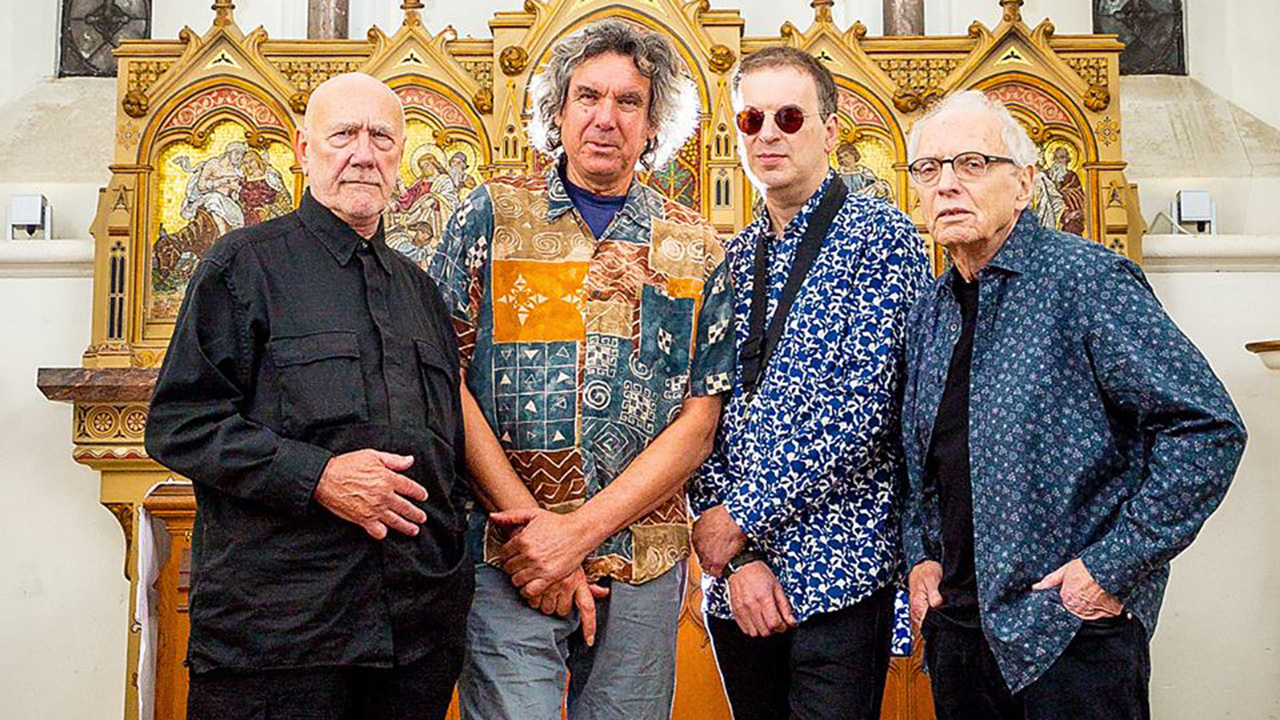When Prog catches up with Soft Machine guitarist John Etheridge, he’s only just returned from the band’s tour in Japan. You might expect him to be resting up and feeling the effects of jet lag, but in fact the 70-year-old player is in the pink after his early morning dip at an outdoor swimming pool in London.
“I go for a swim most mornings at the outside men’s pond in Hampstead Heath which is rather special. I always try to swim every morning even in the winter when it’s minus two degrees,” he laughs.
Diving in head first is something Etheridge has been doing for most of his professional career. When Allan Holdsworth quit the group in 1975, Etheridge had no problem auditioning. “I thought of all the people who were known on the scene at the time and I felt eminently suitable for the job. It was challenging but I was keen: Soft Machine was the band for me.”
Plunging into Soft Machine has never been for the faint-hearted. William Burroughs' 1961 novel from which Daevid Allen, Kevin Ayers, Robert Wyatt and Mike Ratledge took their collective name in 1966, was famed for its ‘cut-up technique’ whereby sentences and paragraphs were shredded and then reassembled to produce startling juxtapositions and unsettling literary images. Were you to construct a mixtape taken from the band’s recorded output, you’d have a similarly contrasting and divergent collection on your hands.
By the time Soft Machine’s 1968 debut album was released, Daevid Allen was
long gone. Yet the record resulted in the establishment of a labyrinthine musical institution that formed the cornerstone of the Canterbury Scene. With each subsequent album all the way through to 1981’s Land Of Cockayne, which was in effect a Karl Jenkins solo album in all but name, a different core line-up was often augmented by heavyweight guests. The ‘cut-up technique’ adopted from this approach to personnel creates some severe and sometimes schizophrenic differences in sound and style, their musical adventures variously encompassing quirky psych pop, experimentally inclined electro-acoustic explorations and sombre-faced excursions into fusion, while carving themselves a distinctive profile on the electric intersection between rock and jazz.

When Etheridge joined he recorded two albums: 1976’s Softs, the last to feature founder Mike Ratledge, and Alive & Well: Recorded In Paris, released in 1978. Although there was a fleeting reunion in the 1980s, Soft Machine were seemingly dead. Yet when the opportunity came to join forces with ex-Softs Hugh Hopper, Elton Dean and John Marshall as Soft Machine Legacy in 2004, such was his enthusiasm for the music that Etheridge had no hesitation in diving in once again.
"I remember one of the first gigs I ever did with Soft Machine Legacy,” says Etheridge. "I didn’t know Hugh or Elton that well, or the etiquette involved. I was soloing and Elton moved over to the keyboards as he used to when he was in Softs but I didn’t want any accompaniment so I shouted, ‘No!’ across the stage. When we came off Hugh said, ‘Well you’ve done it now. You are really in the bad books.’ Of course in free jazz, you don’t shout no at someone, ever.
“I went to Elton and said, ‘I’m really sorry, mate. I’ve been leading bands so long I just forgot that this isn’t my band and I can’t shout no at you.’ He said, ‘No you can’t!’ I apologised profusely and told him, ‘You play the piano whenever you want to play.’ And he said, ‘It doesn’t matter, John. It’s still done! You can apologise all you want but you’re still in the book,’” Etheridge continues, roaring with laughter at the memory.
It’s a fact that despite the often inspired nature of the music produced by the different line-ups throughout the band’s history, the personal interactions between the players was often troubled by seething resentment, grudges and bad blood. Robert Wyatt was kicked out of the band he founded by Mike Ratledge and Hugh Hopper. Elton Dean quit when drummer Phil Howard was sacked. Yet when Soft Machine Legacy formed, people like John Marshall and Hugh Hopper, previously not the easiest of friends first time around in the 1970s, somehow found themselves getting on famously. “It’s about testosterone and hormones and male competition when you’re a young man but then you get past that. The band became a healing process if you like,” observes Etheridge.

After Elton Dean’s death in 2006, Theo Travis was recruited. A world-class saxophonist and flautist, in addition to running his own band, he has worked extensively with King Crimson’s Robert Fripp, and is a member of Steven Wilson’s live and studio group, not to mention his stints in Gong and working with Hatfield & The North’s Richard Sinclair. This all made him a natural choice. Another long-standing admirer of the group in all its incarnations, Travis was keen to add his talents to the overall sound.
“Soft Machine has always been a forward-looking band and when people join, they bring what they bring and the music changes. That’s why they’ve been recruited in the first place. They aren’t there to copy what someone’s done in the past. They want people to come and add and contribute in order to take it forward and that’s how it has always been.”
However, Travis, who doubles on Fender Rhodes piano in the group, does admit to wanting to revisit some older material on the new album. Given his work with looping technology, it’s perhaps no surprise that it was at his urging that Out-Bloody-Rageous from 1970’s Third and 1975’s The Man Who Waved At Trains, which originally appeared on Bundles, both Ratledge-composed tunes, were included in the running order.
“When we were recording as Soft Machine Legacy we always had a link to the past repertoire and even though this is a Soft Machine album, we thought, ‘Why not revisit that material?’” he says. “Although I’m not of a generation that was involved in that first time around, I liked the whole slightly ethereal, less jazz/rock elements that sometimes appeared, whether it be the tape loops or the cosmic delays on the Fender Rhodes. I’ve been doing those kinds of things live and I was keen to incorporate that.”
Does he ever feel burdened by the weight of fan expectation? “With any band that’s got a history like this, there will be people who maybe aren’t aware of what’s been going on for the last 40 years. So there’ll always be questions like, ‘What’s going on with Mike Ratledge?’ Or a question about Robert Wyatt here and there. But it was like that in 1972 when John Marshall first joined. Some fans would always be talking about the earlier period. We just tend to get on with it. This is the set and this is what we’re doing.”
The ‘Legacy’ part of the name was formally dropped in 2015, but in practice, promoters in Europe had been calling them plain old Soft Machine for some time, explains Travis. “Elton Dean wanted to call the group Soft Machine anyway, although Hugh Hopper was less keen. For us it was less of a big deal than you think it would be, but when you do gigs as Soft Machine, people are very excited that they are seeing the band. Going out as Legacy, although the players might be the same, there’s no affinity with the name. People feel emotionally affected by the fact that it’s Soft Machine.”
Recording the new album Hidden Details in December 2017 was an incredibly relaxed affair at Jon Hiseman’s Temple Studios, says Travis, although Hiseman’s subsequent and unexpected death in June this year lends a certain poignancy to the sessions. Travis, Etheridge and Marshall had last worked with Hiseman in 2006, recording Steam, and like everyone who knew him, they were shocked at his passing. “I was shattered when I heard he’d died,” admits Etheridge.
Travis agrees, citing the ex-Colosseum drummer’s presence as a decisive factor in how well Hidden Details has turned out. “Jon was totally on it during those sessions with everything under control. The fact that we recorded an entire double album’s worth of music this time with a couple of extra tracks is a testament to his skills,” he sighs.
Laying down a mix of composed pieces and improvisations, the band recorded live in the studio. With only a couple of minor overdubs and fixes added afterward, there’s a tangible freshness in the sound and performances.
While Travis and Etheridge carry the principal soloing, the interactions from bassist Roy Babbington and drummer John Marshall throughout add to the discursive nature of the band’s music. Babbington joined Soft Machine in 1973 but first appeared on 1971’s Fourth, guesting on double bass, a role he was asked to reprise on 1972’s Fifth, which coincidently was Marshall’s first outing as a member. The empathy between their playing adds to the depth and richness within the group.
Of Marshall’s playing, Etheridge observes, “He has that movement within the time that makes him John Marshall and not just ‘a drummer’ who nails it, bang-bang-bang. He’s looking for give and take, always looking for relationships within the music.”
In respect of Babbington, Etheridge buzzes with excitement recounting the time he saw Soft Machine as a member of the audience at London’s Rainbow in February 1975, when they were supporting Larry Coryell’s Eleventh House. “Roy’s solo was absolutely stunning – the best solo of the night. Completely improvised, it was so well constructed and put together. When Roy joined the Legacy I was very keen on him to use the Fender six-string bass he’d been using back then but it had no bottom end. So now he plays such a deep bass, such a deep sound that’s so fundamental.”
Etheridge points out that the current band has never been happier or more comfortable in their own skin. A key ingredient to that all‑important recipe for happiness is everyone having an equal say in what goes on.
“When I first joined, it was a feudal democracy of the worst kind. Mike Ratledge was on his way out I quickly discovered, and ostensibly everything was group decisions but they weren’t really. Karl had taken over and he’d become the band leader but not officially. So there were always these stirrings and mutterings and resentments because nothing was clear. But with us, it is a democracy, a proper democracy. It’s never happened before in Soft Machine.”

For both Etheridge and Travis, the title track Hidden Details is perhaps the highlight of the new album. “When we did it, it was clear to everyone that it was really strong and it had to be the one that opened the album. It represents what we do. It’s edgy, it’s big, it’s a little bit angular. It connects to the Bundles-era stuff but there are also some other shades on it as well. That track feels very representative of what this band is. We’ll often start gigs with it now,” says Travis, who at 54 is the youngest in the current line-up.
Despite the fact that his colleagues are all in their 70s now, thanks to the indefatigable efforts of their manager and Moonjune Records boss, Leonardo Pavkovic, Soft Machine have a full itinerary for their 50th anniversary, with extensive dates in the UK and America, and are looking forward to more work and recording again.
For John Etheridge, being in this group with this line-up throws up some deeply personal emotions that connect him to the young man he was then and the mature musician he is today. “Perhaps it’s to do with the magic of the name or the feeling or atmosphere that comes with the name? I don’t know, but I can play in a way that I don’t play with anybody else and I enjoy it very much. With this band, there’s a licence to play, and people want you to play the very best you can.”
This article originally appeared in issue 91 of Prog Magazine.

